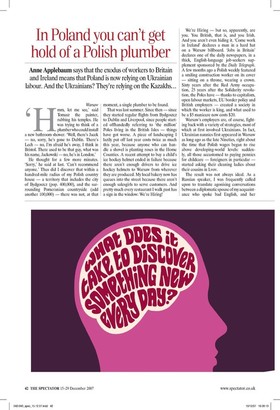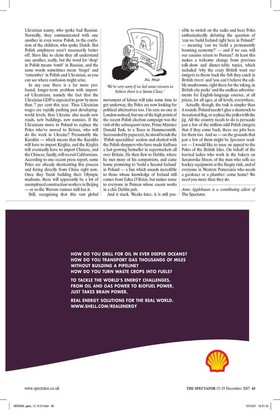In Poland you can't get hold of a Polish plumber
Anne Applebaum says that the exodus of workers to Britain and Ireland means that Poland is now relying on Ukrainian labour. And the Ukrainians? They're relying on the Kazakhs...
Warsaw H 6 mm, let me see,' said Tomasz the painter, rubbing his temples. He was trying to think of a plumber who could install a new bathroom shower. 'Well, there's Jacek â no, sorry, he's gone to Dublin. There's Lech â no, I'm afraid he's away, I think in Bristol. There used to be that guy, what was his name, Jackowski â no, he's in London.'
He thought for a few more minutes. 'Sorry,' he said at last. 'Can't recommend anyone.' Thus did I discover that within a hundred-mile radius of my Polish country house â a territory that includes the city of Bydgoszcz (pop. 400,000), and the surrounding Pomeranian countryside (add another 100,000) â there was not, at that moment, a single plumber to be found.
That was last summer. Since then â since they started regular flights from Bydgoszcz to Dublin and Liverpool, since people started offhandedly referring to 'the million' Poles living in the British Isles â things have got worse. A piece of landscaping I lazily put off last year costs twice as much this year, because anyone who can handle a shovel is planting roses in the Home Counties. A recent attempt to buy a child's ice hockey helmet ended in failure because there aren't enough drivers to drive ice hockey helmets to Warsaw from wherever they are produced. My local bakery now has queues into the street because there aren't enough salesgirls to serve customers. And pretty much every restaurant I walk past has a sign in the window: We're Hiring!
We're Hiring â but so, apparently, are you. You British, that is, and you Irish. And you aren't even hiding it. 'Come work in Ireland' declares a man in a hard hat on a Warsaw billboard. 'Jobs in Britain' declares one of the daily newspapers, in a thick, English-language job-seekers supplement sponsored by the Daily Telegraph. A few months ago a Polish weekly featured a smiling construction worker on its cover â sitting on a throne, wearing a crown. Sixty years after the Red Army occupation, 25 years after the Solidarity revolution, the Poles have â thanks to capitalism, open labour markets, EU border policy and British employers â created a society in which the worker is king, and what used to be a $5 manicure now costs $20.
Warsaw's employers are, of course, fighting back with a variety of strategies, most of which at first involved Ukrainians. In fact, Ukrainian nannies first appeared in Warsaw as long ago as the late Nineties, right about the time that Polish wages began to rise above developing-world levels: suddenly, all those accustomed to paying pennies for childcare â foreigners in particular â started asking their cleaning ladies about their cousins in Lvov.
The result was not always ideal. As a Russian speaker, I was frequently called upon to translate agonising conversations between a diplomatic spouse of my acquaintance who spoke bad English, and her Ukrainian nanny, who spoke bad Russian. Normally, they communicated with one another in even worse Polish, to the confusion of the children, who spoke Dutch. But Polish employers aren't necessarily better off. Slays like to claim they all understand one another, really, but the word for 'shop' in Polish means 'tomb' in Russian, and the same words sometimes mean 'forget' and 'remember' in Polish and Ukrainian, so you can see where confusion might arise.
In any case there is a far more profound, longer-term problem with imported Ukrainians, namely the fact that the Ukrainian GDP is expected to grow by more than 7 per cent this year. Thus Ukrainian wages are rapidly pushing past developingworld levels, thus Ukraine also needs new roads, new buildings, new nannies. If the Ukrainians move to Poland to replace the Poles who've moved to Britain, who will do the work in Ukraine? Presumably the Kazakhs â which means that the Kazakhs will have to import Kirghiz, and the Kirghiz will eventually have to import Chinese, and the Chinese, finally, will recruit Californians. According to one recent press report, some Poles are already shortcutting this process and hiring directly from China right now. Once they finish building their Olympic stadiums, there will apparently be a lot of unemployed construction workers in Beijing â or so the Warsaw rumour mill has it.
Still, recognising that this vast global movement of labour will take some time to get underway, the Poles are now looking for political alternatives too. I'm sure no one in London noticed, but one of the high points of the recent Polish election campaign was the visit of the subsequent victor, Prime Minister Donald Tusk, to a Tesco in Hammersmith. Surrounded by paparazzi, he stood beside the 'Polish specialities' section and chatted with the Polish shoppers who have made kielbasa a fast-growing bestseller in supermarkets all over Britain. He then flew to Dublin, where he met more of his compatriots, and came home promising to 'build a Second Ireland' in Poland â a line which sounds incredible to those whose knowledge of Ireland still comes from Edna O'Brien, but makes sense to everyone in Poznan whose cousin works in a chic Dublin pub.
And it stuck. Weeks later, it is still possible to switch on the radio and hear Poles enthusiastically debating the question of 'can we build Ireland right here in Poland?' â meaning 'can we build a permanently booming economy?' â and if we can, will our cousins return to Poznan? At least this makes a welcome change from previous talk-show and dinner-table topics, which included 'why the crazy British want our émigrés to throw back the fish they catch in British rivers' and 'you can't believe the edible mushrooms, right there for the taking, in British city parks' and the endless advertisements for English-language courses, at all prices, for all ages, at all levels, everywhere.
Actually, though, the task is simpler than it sounds. Poland needn't glue a shamrock to its national flag, or replace the polka with the jig. All the country needs to do is persuade just a few of the million-odd Polish émigrés that if they come back, there are jobs here for them too. And so â on the grounds that just a few of them might be Spectator readers â I would like to issue an appeal to the Poles of the British Isles. On behalf of the harried ladies who work in the bakery on Senatorska Street, of the man who sells ice hockey equipment at the Stegny rink, and of everyone in Western Pomerania who needs a gardener or a plumber: come home! We need you more than they do.
Anne Applebaum is a contributing editor of The Spectator.


































































































 Previous page
Previous page